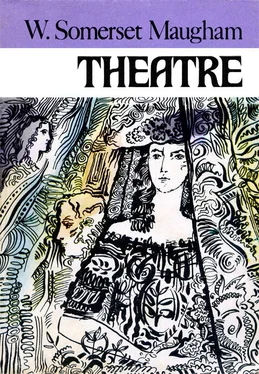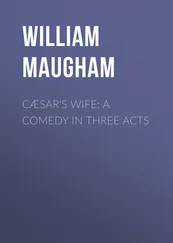William Maugham - Theatre
Здесь есть возможность читать онлайн «William Maugham - Theatre» весь текст электронной книги совершенно бесплатно (целиком полную версию без сокращений). В некоторых случаях можно слушать аудио, скачать через торрент в формате fb2 и присутствует краткое содержание. Жанр: Классическая проза, на английском языке. Описание произведения, (предисловие) а так же отзывы посетителей доступны на портале библиотеки ЛибКат.
- Название:Theatre
- Автор:
- Жанр:
- Год:неизвестен
- ISBN:нет данных
- Рейтинг книги:3 / 5. Голосов: 2
-
Избранное:Добавить в избранное
- Отзывы:
-
Ваша оценка:
- 60
- 1
- 2
- 3
- 4
- 5
Theatre: краткое содержание, описание и аннотация
Предлагаем к чтению аннотацию, описание, краткое содержание или предисловие (зависит от того, что написал сам автор книги «Theatre»). Если вы не нашли необходимую информацию о книге — напишите в комментариях, мы постараемся отыскать её.
is both a tribute to a world from which he had retired and a persuasive testimony to his enthusiasm for drama and the stage.
Theatre — читать онлайн бесплатно полную книгу (весь текст) целиком
Ниже представлен текст книги, разбитый по страницам. Система сохранения места последней прочитанной страницы, позволяет с удобством читать онлайн бесплатно книгу «Theatre», без необходимости каждый раз заново искать на чём Вы остановились. Поставьте закладку, и сможете в любой момент перейти на страницу, на которой закончили чтение.
Интервал:
Закладка:
‘Unless this young man is a much bigger fool than I think him he must know that there’s nothing in the way of acting that you can’t do.’
‘Oh, that’s only an idea that people have got because I take care never to do anything but what I can do.’
Presently Michael looked at his watch.
‘I think when you’ve finished your coffee, young man, we ought to be going.’
The boy gulped down what was left in his cup and Julia rose from the table.
‘You won’t forget my photograph?’
‘I think there are some in Michael’s den. Come along and we’ll choose one.’
She took him into a fair-sized room behind the dining-room. Though it was supposed to be Michael’s private sitting-room—‘a fellow wants a room where he can get away by himself and smoke his pipe’—it was chiefly used as a cloak-room when they had guests.
There was a noble mahogany desk on which were signed photographs of George V and Queen Mary. Over the chimney-piece was an old copy of Lawrence’s portrait of Kemble as Hamlet. On a small table was a pile of typescript plays.
The room was surrounded by bookshelves under which were cupboards, and from one of these Julia took a bundle of her latest photographs. She handed one to the young man.
‘This one is not so bad.’
‘It’s lovely.’
‘Then it can’t be as like me as I thought.’
‘But it is. It’s exactly like you.’
She gave him another sort of smile, just a trifle roguish; she lowered her eyelids for a second and then raising them gazed at him for a little with that soft expression that people described as her velvet look. She had no object in doing this. She did it, if not mechanically, from an instinctive desire to please. The boy was so young, so shy, he looked as if he had such a nice nature, and she would never see him again, she wanted him to have his money’s worth; she wanted him to look back on this as one of the great moments of his life. She glanced at the photograph again. She liked to think she looked like that. The photographer had so posed her, with her help, as to show her at her best. Her nose was slightly thick, but he had managed by his lighting to make it look very delicate, not a wrinkle marred the smoothness of her skin, and there was a melting look in her fine eyes.
‘All right. You shall have this one. You know I’m not a beautiful woman, I’m not even a very pretty one; Coquelin always used to say I had the beauté du diable. You understand French, don’t you?’
‘Enough for that.’
‘I’ll sign it for you.’
She sat at the desk and with her bold, flowing hand wrote: Yours sincerely, Julia Lambert.
2
WHEN the two men had gone she looked through the photographs again before putting them back.
‘Not bad for a woman of forty-six,’ she smiled. ‘They are like me, there’s no denying that.’ She looked round the room for a mirror, but there wasn’t one. ‘These damned decorators. Poor Michael, no wonder he never uses this room. Of course I never have photographed well.’
She had an impulse to look at some of her old photographs. Michael was a tidy, business-like man, and her photographs were kept in large cardboard cases, dated and chronologically arranged. His were in other cardboard cases in the same cupboard.
‘When someone comes along and wants to write the story of our careers he’ll find all the material ready to his hand,’ he said.
With the same laudable object he had had all their press cuttings from the very beginning pasted in a series of large books.
There were photographs of Julia when she was a child, and photographs of her as a young girl, photographs of her in her first parts, photographs of her as a young married woman, with Michael, and then with Roger, her son, as a baby. There was one photograph of the three of them, Michael very manly and incredibly handsome, herself all tenderness looking down at Roger with maternal feeling, and Roger a little boy with a curly head, which had been an enormous success. All the illustrated papers had given it a full page and they had used it on the programmes. Reduced to picture-postcard size it had sold in the provinces for years. It was such a bore that Roger when he got to Eton refused to be photographed with her any more. It seemed so funny of him not to want to be in the papers.
‘People will think you’re deformed or something,’ she told him. ‘And it’s not as if it weren’t good form. You should just go to a first night and see the society people how they mob the photographers, cabinet ministers and judges and everyone. They may pretend they don’t like it, but just see them posing when they think the camera man’s got his eye on them.’
But he was obstinate.
Julia came across a photograph of herself as Beatrice. It was the only Shakespearean part she had ever played. She knew that she didn’t look well in costume; she could never understand why, because no one could wear modern clothes as well as she could. She had her clothes made in Paris, both for the stage and for private life, and the dressmakers said that no one brought them more orders. She had a lovely figure, everyone admitted that; she was fairly tall for a woman, and she had long legs. It was a pity she had never had a chance of playing Rosalind, she would have looked all right in boy’s clothes, of course it was too late now, but perhaps it was just as well she hadn’t risked it. Though you would have thought, with her brilliance, her roguishness, her sense of comedy she would have been perfect. The critics hadn’t really liked her Beatrice. It was that damned blank verse. Her voice, her rather low rich voice, with that effective hoarseness, which wrung your heart in an emotional passage or gave so much humour to a comedy line, seemed to sound all wrong when she spoke it. And then her articulation; it was so distinct that, without raising her voice, she could make you hear her every word in the last row of the gallery; they said it made verse sound like prose. The fact was, she supposed, that she was much too modern.
Michael had started with Shakespeare. That was before she knew him. He had played Romeo at Cambridge, and when he came down, after a year at a dramatic school, Benson had engaged him. He toured the country and played a great variety of parts. But he realized that Shakespeare would get him nowhere and that if he wanted to become a leading actor he must gain experience in modern plays. A man called James Langton was running a repertory theatre at Middlepool that was attracting a good deal of attention; and after Michael had been with Benson for three years, when the company was going to Middlepool on its annual visit, he wrote to Langton and asked whether he would see him. Jimmie Langton, a fat, bald-headed, rubicund man of forty-five, who looked like one of Rubens’ prosperous burghers, had a passion for the theatre. He was an eccentric, arrogant, exuberant, vain and charming fellow. He loved acting, but his physique prevented him from playing any but a few parts, which was fortunate, for he was a bad actor. He could not subdue his natural flamboyance, and every part he played, though he studied it with care and gave it thought, he turned into a grotesque. He broadened every gesture, he exaggerated every intonation. But it was a very different matter when he rehearsed his cast; then he would suffer nothing artificial. His ear was perfect, and though he could not produce the right intonation himself he would never let a false one pass in anyone else.
‘Don’t be natural,’ he told his company. ‘The stage isn’t the place for that. The stage is make-believe. But seem natural.’
He worked his company hard. They rehearsed every morning from ten till two, when he sent them home to learn their parts and rest before the evening’s performance. He bullied them, he screamed at them, he mocked them. He underpaid them. But if they played a moving scene well he cried like a child, and when they said an amusing line as he wanted it said he bellowed with laughter. He would skip about the stage on one leg if he was pleased, and if he was angry would throw the script down and stamp on it while tears of rage ran down his cheeks. The company laughed at him and abused him and did everything they could to please him. He aroused a protective instinct in them, so that one and all they felt that they couldn’t let him down. Though they said he drove them like slaves, and they never had a moment to themselves, flesh and blood couldn’t stand it, it gave them a sort of horrible satisfaction to comply with his outrageous demands. When he wrung an old trooper’s hand, who was getting seven pounds a week, and said, by God, laddie, you’re stupendous, the old trooper felt like Charles Kean.
Читать дальшеИнтервал:
Закладка:
Похожие книги на «Theatre»
Представляем Вашему вниманию похожие книги на «Theatre» списком для выбора. Мы отобрали схожую по названию и смыслу литературу в надежде предоставить читателям больше вариантов отыскать новые, интересные, ещё непрочитанные произведения.
Обсуждение, отзывы о книге «Theatre» и просто собственные мнения читателей. Оставьте ваши комментарии, напишите, что Вы думаете о произведении, его смысле или главных героях. Укажите что конкретно понравилось, а что нет, и почему Вы так считаете.











